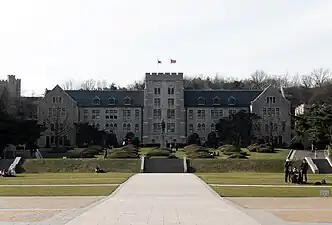The International Consortium of Universities for the Study of Biodiversity and the Environment or iCUBE aims to connect a group of public research universities to form a consortium to address the problems and issues related to biodiversity and the environment, for both research and educational purposes.[1][2]
Members
iCUBE is composed of a key group of public research universities sharing a common mission whilst committed to education and research on the environment, biodiversity and climate change, namely:[3][4][5][6][7][8]
Objective
iCUBE aims to promote awareness and understanding, disseminate knowledge as well conduct collaborative research on problems and issues relevant to the environment and biodiversity. The group is designed to strengthen the existing international linkages and further it by promoting educational and intellectual exchanges as well as collaboration among scholars and students.[9][10]
References
- ↑ "Universiti Brunei Darussalam". Archived from the original on 2016-08-19. Retrieved 2016-07-23.
- ↑ "iCUBE - The International Consortium of Universities for the Study of Biodiversity and the Environment". Icubeconsortium.org. Retrieved 26 March 2019.
- ↑ "Contact". Icubeconsortium.org. Retrieved 26 March 2019.
- ↑ "Office of International Affairs". Oia.korea.ac.kr. Retrieved 26 March 2019.
- ↑ "King's College London - About the UNC-King's Alliance". Archived from the original on 2016-09-23. Retrieved 2016-07-23.
- ↑ "International Collaborations - Department of History". Archived from the original on 2016-07-30. Retrieved 2016-07-23.
- ↑ "ICUBE membership expansion on the cards | Borneo Bulletin Online". Archived from the original on 2016-09-18. Retrieved 2016-07-23.
- ↑ "ZEF E-Newsletter" (PDF). Zef.de. 2011. Retrieved 26 March 2019.
- ↑ "About". Icubeconsortium.org. Retrieved 26 March 2019.
- ↑ "ICube launches Bukit Pagon book | the Brunei Times". Archived from the original on 2016-08-21. Retrieved 2016-07-23.






